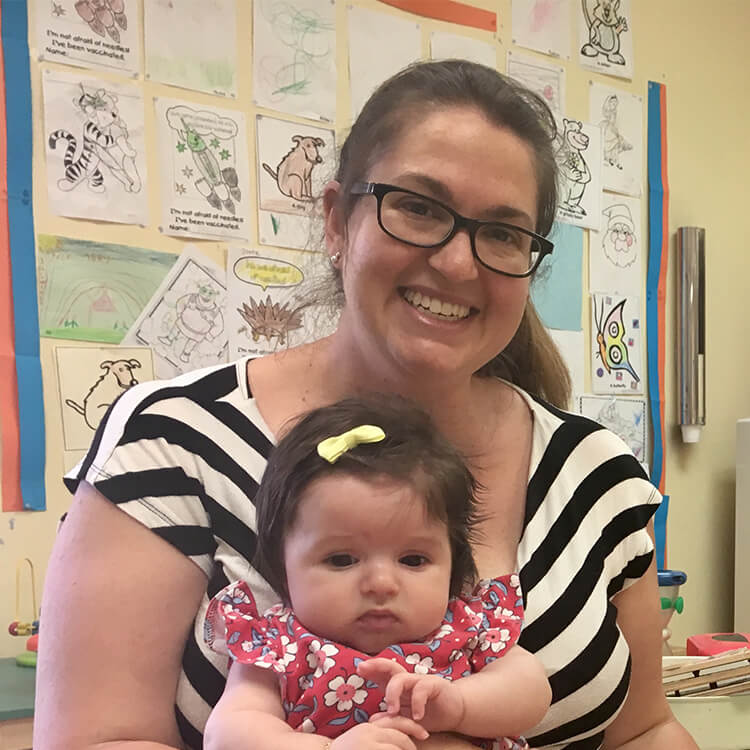Search

News & Events
Perth mums play instrumental part in world-first vaccineNew mothers in Perth are teaming up with researchers at The Kids Research Institute Australia in a global bid to develop the first vaccine to prevent Respiratory Syncytial Virus (RSV) disease.
Research
Composition of early life leukocyte populations in preterm infants with and without late-onset sepsisComposition of leukocyte populations in the first month of life remains incompletely characterised, particularly in preterm infants who go on to develop late-onset sepsis (LOS). The aim of the study was to characterise and compare leukocyte populations in preterm infants with and without LOS during the first month of life.
Research
Efficacy of the adjuvanted subunit protein COVID-19 vaccine, SCB-2019: a phase 2 and 3 multicentre, double-blind, randomised, placebo-controlled trialA range of safe and effective vaccines against SARS CoV 2 are needed to address the COVID 19 pandemic. We aimed to assess the safety and efficacy of the COVID-19 vaccine SCB-2019.
Research
Lack of effectiveness of 13-valent pneumococcal conjugate vaccination against pneumococcal carriage density in Papua New Guinean infantsPapua New Guinea (PNG) introduced the 13-valent pneumococcal conjugate vaccine (PCV13) in 2014, with administration at 1, 2, and 3 months of age. PCV13 has reduced or eliminated carriage of vaccine types in populations with low pneumococcal carriage prevalence, carriage density and serotype diversity.
Research
An Observational Study to Assess the Effectiveness of 4CMenB against Meningococcal Disease and Carriage and Gonorrhea in Adolescents in the Northern Territory, Australia—Study ProtocolInvasive meningococcal disease (IMD) causes significant morbidity and mortality worldwide with serogroup B being the predominant serogroup in Australia and other countries for the past few decades. The licensed 4CMenB vaccine is effective in preventing meningococcal B disease. Emerging evidence suggests that although 4CMenB impact on carriage is limited, it may be effective against gonorrhoea due to genetic similarities between Neisseria meningitidis and Neisseria gonorrhoeae.
Research
Statistical analysis plan for the OPTIMUM study: optimising immunisation using mixed schedules, an adaptive randomised controlled trial of a mixed whole-cell/acellular pertussis vaccine scheduleThe purpose of this double-blind, randomised, controlled trial is to compare allergic outcomes in children following vaccination with acellular pertussis (aP) antigen (standard of care in Australia) given at 2 months of age versus whole cell pertussis (wP) in the infant vaccine schedule.
Research
Bivalent Prefusion F Vaccine in Pregnancy to Prevent RSV Illness in InfantsWhether vaccination during pregnancy could reduce the burden of respiratory syncytial virus (RSV)-associated lower respiratory tract illness in newborns and infants is uncertain.
Research
Clinical predictors of hypoxic pneumonia in children from the Eastern Highlands Province, Papua New Guinea: secondary analysis of two prospective observational studiesPneumonia is the leading cause of death in young children globally and is prevalent in the Papua New Guinea highlands. We investigated clinical predictors of hypoxic pneumonia to inform local treatment guidelines in this resource-limited setting.
Research
Infant Whole-Cell Versus Acellular Pertussis Vaccination in 1997 to 1999 and Risk of Childhood Hospitalization for Food-Induced Anaphylaxis: Linked Administrative Databases Cohort StudyEvidence suggests that children who had received an initial priming dose of whole-cell pertussis (wP) vaccine, rather than acellular pertussis (aP) vaccine, had a lower risk of developing IgE-mediated food allergy, the most common cause of anaphylaxis-related hospital presentations of childhood.
Research
Respiratory Syncytial Virus Reinfections in Children in Western AustraliaRespiratory syncytial virus (RSV) reinfection in children is poorly understood. We examined the incidence, characteristics, and outcomes of hospital-attended RSV reinfections in children <16 years in Western Australia between 2012 and 2022.
